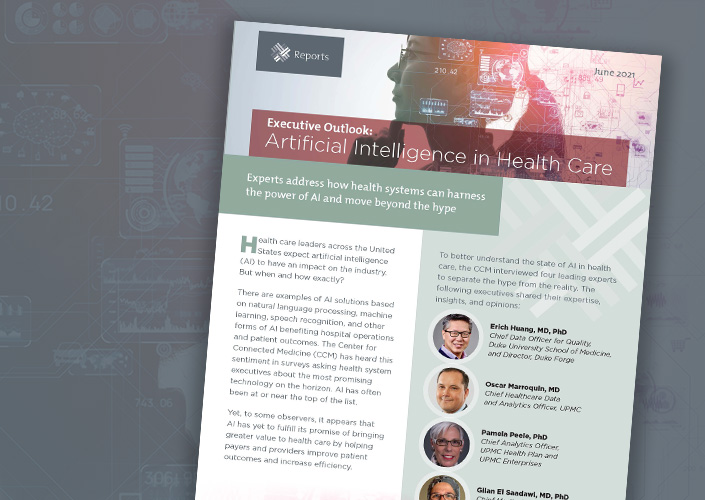Experts address how health systems should harness the power of AI in new CCM report available to download
Health care leaders across the United States expect artificial intelligence (AI) to have an impact on the industry. But when and how exactly?
There are examples of AI solutions based on natural language processing, machine learning, speech recognition, and other forms of AI benefiting hospital operations and patient outcomes. The Center for Connected Medicine (CCM) has heard this sentiment in surveys asking health system executives about the most promising technology on the horizon. AI has often been at or near the top of the list.
Yet, to some observers, it appears that AI has yet to fulfill its promise of bringing greater value to health care by helping payers and providers improve patient outcomes and increase efficiency.
To better understand the state of AI in health care, the CCM interviewed four leading experts to separate the hype from the reality. The following executives shared their expertise, insights, and opinions:
- Erich Huang, MD, PhD, Chief Data Officer for Quality, Duke University School of Medicine, and Director, Duke Forge
- Oscar Marroquin, MD, Chief Healthcare Data and Analytics Officer, UPMC
- Pamela Peele, PhD, Chief Analytics Officer, UPMC Health Plan and UPMC Enterprises
- Gilan El Saadawi, MD, PhD, Chief Medical Officer, Realyze Intelligence
They each addressed questions related to the AI in health care. Below are highlights from their answers.
Using AI in response to COVID-19
A common AI technology, machine learning, wasn’t useful for large scale modeling during COVID-19 because of a lack of standardization across the U.S., Dr. Huang explained.
“In order to make a machine learning algorithm really useful for people, it needs to be able to plug into a source of data that’s standardized. It’s been difficult for health systems across the country to do that, because once you’ve seen one health system’s electronic health record you’ve only seen one system’s electronic health record,” said Dr. Huang, highlighting the problem of non-standardized data across health care.
Where AI is effective in health care
NLP is used in health care in several limited ways, including in revenue cycle for computer-assisted coding and clinical documentation improvement, Dr. Saadawi noted. Voice recognition, a conversational AI leveraging natural language processing, is moving from solely being a dictation tool to becoming a virtual assistant listening to the patient and provider to understand what’s being said.
The next step, Dr. Saadawi explained, would be to have AI solutions that help clinicians predict the problems patients will experience and allow doctors to intervene earlier. “I’m not saying it’s easy. I’m not saying that it can be done quickly. We need to reach a level of accuracy that’s accepted by clinicians and that’s why it is progressing slowly,” she said.
Biggest obstacles to implementing AI in health care
A major challenge for health systems to overcome if they want to adopt AI is gaining access to enough data to develop accurate and robust algorithms. But even large health systems, don’t necessarily have the infrastructure in place to standardize and analyze their data, Dr. Marroquin explained.
“One has to have the right data and analytics infrastructure in place to be able to make that data available so that they can be utilized for the whole continuum of analytics — from basic descriptive statistics all the way to doing more complex artificial intelligence, such as machine learning algorithms,” he said.
There are many steps needed to build that infrastructure, from data harmonization tools to having the teams in place to handle data curation and maintenance of models. For UPMC, it has been a 10-year process to build the foundation of its analytics program, according to Dr. Marroquin.
The role of AI in value-based care
AI can help health systems achieve greater value for patients by optimizing for better clinical outcomes. But health systems need to be willing to take on financial risk and embrace value-based payments.
AI can be deployed to better judge the types of care and services that have more value. “Care is not consistent or uniform from one patient to another. Using AI, we would be able to do a better job of understanding the difference between low-value care and high-value care,” Dr. Peele said. “It is a perfect problem for AI, in my opinion. And if we could do that, that would be the foundation for standing up value-based care and in particular value-based payments.”
More AI resources from the CCM
- Report: Executives share vision for role of AI and machine learning in improving health disparities
- Expert panel discussion, “The Intersection of Value and AI: Where Machines Can Make a Difference”
- VIDEO: Health care leaders discuss the tremendous potential for AI to impact health care
- Infographic: Artificial intelligence generating excitement amongst health system leaders



